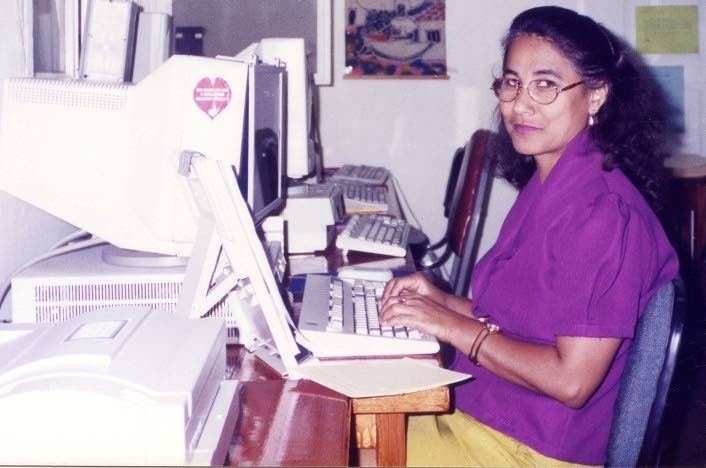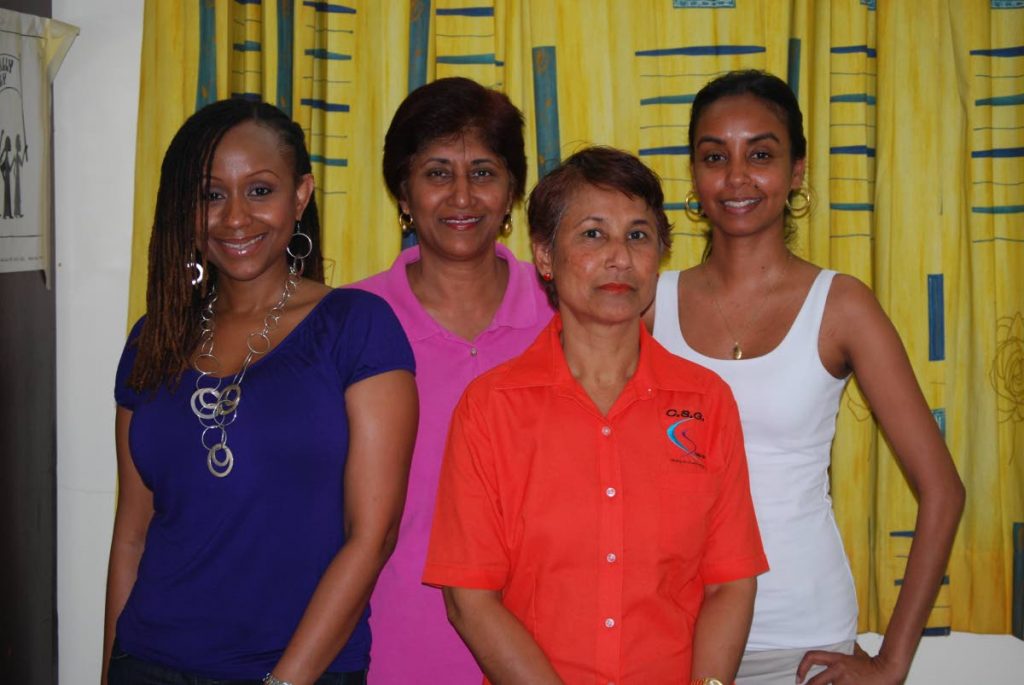Cafra TT tribute to Tara Ramoutar: Walk good Sistah!

Caribbean Association for Feminist
Research and Action, TT Chapter (Cafra TT)
Yes, it is Bread we fight for
But we fight for Roses, too
(James Oppenheim, 1911)
Tara Ramoutar was a TT-born labour and feminist activist whose work and service impacted the Caribbean. Since her passing on September 19, after a long battle with cancer, tributes have been pouring in from Cafra members around the region and advocates for women’s rights and gender equality.
The early years: TIWU and CWP (1970s-1983)
Tara’s route to feminism was through the trade union movement. Rhoda Reddock first met her in the mid-1970s when she attended meetings of the TT-Cuba Friendship Society and Puerto Rican Solidarity Association, at the Transport and Industrial Workers’ Union (TIWU), where Tara worked. Patricia Mohammed noted that “Tara’s work with TIWU helped to shape her feminist politics, having been exposed to the way in which women constituted the majority of low-paid workers in garment factories and unorganised industry, and had little power of negotiation.”
In January 1981, Tara represented TIWU at a meeting of women’s rights activists convened by the People’s Popular Movement, at which the Concerned Women for Progress (CWP) was born. An independent, socialist, second wave feminist organisation, it was the first of its kind in TT. Members included Patricia Bynoe, Carol Gobin, Thelma Henderson, Salisha Hosein, Cheryl King, Gaietry Pargass, Cathy Shepherd, Mohammed, Tara and Reddock.
Shepherd recalled that during CWP’s short-lived existence (1981-1983), members picketed a beauty pageant organised by Janelle Commissiong (May 1981); conducted an anti-consumerist, poster campaign (December 1981); advocated for equal pay for work of equal value, and women’s health and reproductive rights; and organised public forums on rape and women’s legal rights.
Through Tara, TIWU became the venue for CWP’s International Women’s Day activities, and the rendezvous for the journey to Fyzabad for Labour Day celebrations. Of the events Mohammed said, “It is the sisterhood and fellowship of women like Tara who made the CWP a founding movement in this society. She must be counted as one of our stalwart founding members in the dispatches of Caribbean feminism.”
The Cafra years (1993-present)
Tara joined the regional secretariat of the Cafra in 1993, becoming a valuable member of the team. During her nine-year stint, she attended Cafra’s third general meeting in Guyana; mourned the unexpected death of a co-worker; participated in the preparations and follow-up of the Fourth World Conference on Women (Beijing, 1995); and worked with Unifem on a one-year regional campaign on violence against women.
Secretariat colleague, Charmaine Sinkia-Diaz remembers she was “always willing and helpful, which was important as we had a small staff and very busy days.”
“Her typing speed,” she added, “was amazing to watch.”

Colleagues, Julieta Alfonso and Jacquie Burgess said she was “ever seeking to improve herself.” In the eyes of the then Cafra co-ordinator, Nelcia Robinson, Tara was “a star shining above the hills and mountain tops.”
Having no children of her own, Tara mothered the children of her colleagues with love and hugs.
In April 2003, she was elected national representative of Cafra’s TT chapter, a position she held for over a decade (2003-2014). She worked hard to bring her ideas to fruition, and blossomed into a feminist trailblazer and icon.
In a bid to keep the membership interested and active, she organized many events and meetings on issues such as gender-based violence and women’s health. Crystal Brizan and Yolanda Simon described her as the organisation’s chief cook and bottlewasher, who “kept us all in line with her sharp tongue and quick wit.”.
“She never failed to call meetings,” Pargass recalled, “and I marvelled at how she found the rent for the office, some of it coming from Cafra TT’s tea parties.”
An annual, International Women’s Day Tea Party was one of Tara’s fundraising initiatives to keep the office operational. Former colleague, Sinkia-Diaz observed that, “she used the format of the traditional tea party to engage a wider audience with feminist ideas, and created a warm and caring environment for members, friends and colleagues to gather.”
“Tara was steadfast in her commitment to the work of Cafra,” said Roberta Clarke. “Not only the ‘what’ of the work but also the ‘how’. With integrity and honesty, she mobilised members and was accountable.”
National and regional impact
As Cafra TT’s national representative, Tara served on the organisation’s main decision-making body, the regional committee. According to her Jamaican counterpart, Michelle Golding-Hylton, “Tara’s was a constant voice advocating for Cafra to expand the membership to include other countries.”
Joan French, Cafra founding member of Jamaica, described Tara as “a committed, principled, ideologically clear, courageous and consistent member of Cafra and the regional feminist movement.” Margaret Gill (Barbados), Josephine Dublin-Prince (Dominica) and Sandra Clenem (Suriname) are among several regional feminists to hail her contribution.
Tara also inspired a new generation of feminists. She mentored Liz Lloyd and Samantha Rattan, introducing them to the empowering experience of blending academia and action. For Yolanda Simon and Renelle White, she was the face of Cafra.
Several civil society organisations have lauded Tara’s contribution to women’s and workers’ rights. Diana M Wyatt (Caribbean Centre for Human Rights) noted her heroic struggles with cancer and placed her “on our list of women of honour.”
Folade Mutota (Women's Institute for Alternative Development) said she was “a leader in the TT women's movement.” The Family Planning Association of TT noted on its Facebook page, “It is a tribute to her passionate determination that so many of us, particularly in civil society, feel such a deep sense of loss at her passing.”
Gabrielle Hosein (Institute for Gender and Development Studies, UWI) hoped that her spirit of sisterhood would continue to inspire Caribbean feminists of future generations.
Tara Ramoutar – the woman
Tributes pouring in from her fellow activists and friends paint an indelible portrait of the woman behind the name. Physically, “she was a pint-sized, powerhouse,” in the eyes of Brizan. Her diminutive stature, however, “belied her strength, stridency, organizing skills, and commitment to the women’s movement,” according to Pargass.
Gill (Barbados), on the other hand, remembered “a peaceful soul, possessing a light laughing voice and strength of purpose.” To Rattan, she was warm and kind, with a “powerful determination towards her activist pursuits.” David Abdulah described her as “a wonderful person and activist.”
Judith Laird praised her “gentleness and efficiency;” while “her kind ways, ready smile and generous nature” are forever etched in Clarke’s memory.
Her dear friends, Nirmala Chatar and Brenda Gopeesingh, described her as “strong” and “humble, unassuming and elegant,” respectively. She was “helpful and always there” for Nicole Hendrickson; and “one in a million” to Paula Obe.
Cafra founding member and first co-ordinator, Rawwida Baksh, affirmed that, “Tara’s experience in the labour and socialist feminist movements, as well as organisational administration provided her with the knowledge, commitment and skills to join the Cafra secretariat team, and contribute to building the Caribbean regional feminist movement.”
Tara, we are grateful for your dedication and service to national and regional movement-building in the promotion of workers’ rights, gender equality, and economic and social justice. Your contribution will motivate us to continue the struggle to create a more just, equitable and sustainable society. We will remember your strength and commitment, and you will live on in our hearts. Walk good, Sistah!

Comments
"Cafra TT tribute to Tara Ramoutar: Walk good Sistah!"